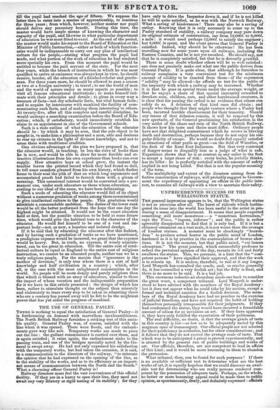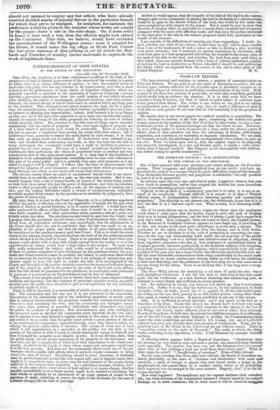UNPRECEDENTED SUCCESS OF THE WELLINGTON STATUE.
THE general impression appears to be, that the Wellington statue is not so atrocious after all. The burst of ridicule which harbin- gered its issue into the world has been useful to the artist in pro- ducing a sense of disappointment. It seems that people expected something still more monstrous — a " monstrum horrendum," says the Times, "in ens, informe " ; and the public is rather agreeably disappointed to find that it is only bad. If it is but a chimney-ornament on a vast scale, it is not worse than the average of London statues. A monster must be shockingly " horren- dum" to produce actual horror in the public mind of London, hardened as it is by practice in the contemplation of bronze abor- tions. It is not the monster, but that public mind, " cui lumen ademptum." The great journal, which successfully professes to reflect the prevalent opinion of the day, recants its wit and fairly swallows the statue. This, we presume, is a hint that the "com- petent persons " have signified their approval, and that the work is to remain up. It is useless, therefore, to rail at it any longer. Lord Morpeth has consulted the oracle, and, as oracles generally do, it has counselled a very foolish act ; but the folly is final, and there is no more to be said. It is a bad job.
This enormous reductio ad absurdum sends one back to consider the great want, a competent tribunal. Lord Morpeth is under- stood to have advised with the members of the Royal Academy: but it does not appear what he could take by his motion, except a formal and technical sanction for a foolish decision. The mem- bers of the Royal Academy have had no practice in the exercise of judicial functions, and have not acquired the habit of holding themselves personally irresponsible for their judgments. If they had condemned the statue, they would have incurred a formidable amount of odium for so invidious an act. If they have approved it, they have only fulfilled the expectation of their politeness.
The real difficulty, no doubt, is that the average grade of taste in this country is low—so low as to be adequately meted by this magnum opus of ironmongery. Our official people are not selected. for their proficiency in aesthetics, but for other considerations ; and- it follows that they do not exceed the average scale of taste. That which was to be anticipated a priori is proved experimentally, and* is attested by the general run of public buildings and works of art. Our officials, therefore, are not competent to lead in affairs of this kind ; and it would be more becoming in them to abandon the pretension.
What tribunal, then, can be found for such purposes ? If there is no available or sufficient test to determine what are the best works of art, it is equally hopeless that we could discover an avail- able test for determining who are really persons rendered com- petent by the possession of adequate taste. Perhaps, on the whole, no better or more becoming appeal could be made than to public opinion, as spontaneously, freely, and definitely expressed : officials
should not pretend to employ any-but artists who have already received decided marks of favour in the particular branch for-which they are to be engaged. In sculpture, for instance, the preference would be given to the sculptor whose works are sought by the people—have a sale in- the.cast-shops, . Or; if none could bte found to bear such a test; then the officials might look abroad On the Continent. This -rule, we believe, would have excluded the manufacturer of the Wellington statue: were it adopted-for the future, it would make- the big effigy at Hyde Park Corner the last gross instance of thatjobbing in art by-which the Rut- lands-and Trenches of wealthy circles undertake to supersede the work of legitimate fame.



























 Previous page
Previous page